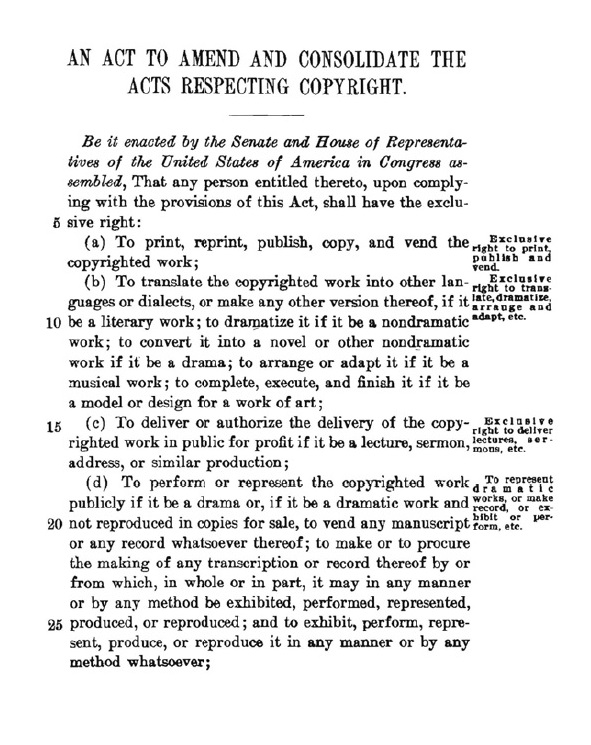1998 - 2012
Highlight: Congress Passes the Digital Millennium Copyright Act

On October 28, 1998, President Bill Clinton signed the Digital Millennium Copyright Act (DMCA). The Act provided for implementation of the WIPO Copyright Treaty and the Performances and Photogram Treaty, limited online infringement liability for internet service providers, created a form of protection for vessel hulls, and clarified the role of the Copyright Office.
The DMCA provision governing online infringement, codified in 17 U.S.C. § 1201-1205, makes it illegal to circumvent technological measures used to prevent unauthorized access to or copying of copyrighted works, particularly books, movies, videos, video games, and computer programs. The DMCA created a safe harbor for online service providers (OSPs) against infringement liability for storing copyrighted material at the direction of a user, so long as the OSP engaged in certain procedures to address potentially infringing works. Known colloquially as a “notice-and-takedown” procedure, the OSP must first designate an agent to receive notices by copyright holders of claimed infringement. Upon effective notice, a service provider must expeditiously remove, or disable access, to the allegedly infringing material and send notice to the user who posted the material. The user then has the option to send a counter-notice, claiming that the material was taken down in error. The OSP then must notify the original claimant of the counter-notice, and may repost the material at issue within 10-14 business days unless the claimant files suit against the user. The Copyright Office maintains a list of all registered designated agents, which can be found here.
The DMCA also obligates the Librarian of Congress, upon the recommendation of the Register of Copyrights, to engage in a rulemaking proceeding every three years to adopt exemptions from the general prohibition against circumvention. The Sixth Triennial Section 1201 Proceeding was completed in 2015, and provides exemptions, subject to certain conditions, for twenty-two different types of uses, from adapting digital literary works for use for the print disabled to accessing software in cars and farm equipment for the purpose of diagnosis, repair, and personal modification. For a full list of exemptions to the DMCA, along with analysis of the exemptions and a full rulemaking history, click here.
-
History of the Copyright Office
-
Copyright Law
-
Copyright in the Courts
-
Copyright Term Extended
October 27, 1998
The Sonny Bono Copyright Term Extension Act extends term of copyright protection for most works to the life of the author plus 70 years.
-
Digital Millennium Copyright Act
October 28, 1998
The Digital Millennium Copyright Act provides for implementation of the WIPO Copyright Treaty and the Performances and Phonograms Treaty, limits online infringement liability for Internet service providers, and creates a form of protection for vessel hulls, and clarifies the role of the Copyright Office.
-
Copyrighted Works and Distance Education
November 2, 2002
The Technology, Education, and Copyright Harmonization Act of 2002 provides for the use of copyrighted works by accredited nonprofit educational institutions in distance education.
-
Supreme Court Upholds Copyright Term Extension
January 15, 2003
In "Eldred v. Ashcroft," the U.S. Supreme Court upholds the constitutionality of The Sonny Bono Copyright Term Extension Act.
-
Preregistration Introduced
April 27, 2005
The Artists' Rights and Theft Prevention Act allows for preregistration of certain works being prepared for commercial distribution.
-
Supreme Court Rules on File-Sharing Software
June 27, 2005
In "Metro-Goldwyn-Mayer Studios, Inc. v. Grokster," the Supreme Court rules that providers of software designed to enable file sharing of copyrighted works may be held liable for copyright infringement that takes place using that software.
-
Electronic Copyright Registration Begins
July 1, 2007
Electronic registration on the Copyright Office website is made available to the public.
-
Twelfth Register Is Appointed
June 1, 2011

Maria A. Pallante held senior positions in the Copyright Office, including as acting Register, and at the Guggenheim Museum before her appointment.
-
Supreme Court rules that Congress may restore copyright in certain foreign works
January 18, 2012
The Supreme Court upholds the Uruguay Round Agreements Act when it holds in “Golan v. Holder” that Congress may restore copyright in public domain works.
-
The United States becomes a signatory to the Beijing Treaty on Audiovisual Performances
June 26, 2012
The United States becomes a signatory to the Beijing Treaty on Audiovisual Performances, which updates the international legal framework for audiovisual performers to provide rights and protections similar to those already provided for musical performers under the WIPO Performances and Phonograms Treaty. The Treaty now awaits ratification by the U.S. Senate.
